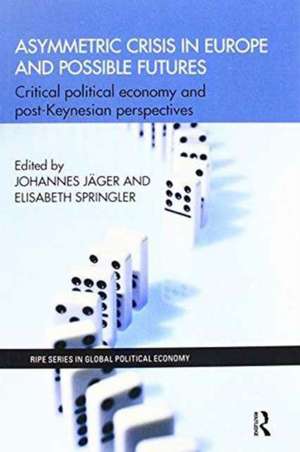Asymmetric Crisis in Europe and Possible Futures: Critical Political Economy and Post-Keynesian Perspectives: RIPE Series in Global Political Economy
Editat de Johannes Jäger, Elisabeth Springleren Limba Engleză Paperback – 26 oct 2016
This volume seeks to close this gap by systematically integrating the analysis of economic policy or ‘technical’ solutions to the crisis within a broader framework of political economy. It argues that combining critical political economy approaches and post-Keynesian perspectives allows for a systematic understanding of the economic and political dimensions of the crisis. Although both approaches have the capacity to deal with asymmetries and uneven development, the heterogeneity in Europe has been an often largely neglected dimension of analysis. However, this recent crisis has shown that this is an essential dimension which has to be addressed in order to better understand the dynamics of European development and integration. Hence, this book aims to deal with asymmetries in Europe and to bridge the gap between the two perspectives.
This work will initiate an integrative debate that is crucial for a deeper understanding of the current crisis and is an important resource for all students and scholars of IPE, European political economy and European politics.
| Toate formatele și edițiile | Preț | Express |
|---|---|---|
| Paperback (1) | 246.49 lei 6-8 săpt. | |
| Taylor & Francis – 26 oct 2016 | 246.49 lei 6-8 săpt. | |
| Hardback (1) | 1057.89 lei 6-8 săpt. | |
| Taylor & Francis – 14 apr 2015 | 1057.89 lei 6-8 săpt. |
Din seria RIPE Series in Global Political Economy
-
 Preț: 310.75 lei
Preț: 310.75 lei -
 Preț: 280.02 lei
Preț: 280.02 lei -
 Preț: 281.27 lei
Preț: 281.27 lei -
 Preț: 310.01 lei
Preț: 310.01 lei -
 Preț: 390.13 lei
Preț: 390.13 lei -
 Preț: 288.81 lei
Preț: 288.81 lei - 26%
 Preț: 820.21 lei
Preț: 820.21 lei - 18%
 Preț: 700.75 lei
Preț: 700.75 lei -
 Preț: 386.55 lei
Preț: 386.55 lei -
 Preț: 470.90 lei
Preț: 470.90 lei - 18%
 Preț: 999.82 lei
Preț: 999.82 lei - 18%
 Preț: 1054.97 lei
Preț: 1054.97 lei - 18%
 Preț: 1057.40 lei
Preț: 1057.40 lei - 18%
 Preț: 1055.60 lei
Preț: 1055.60 lei - 18%
 Preț: 1053.16 lei
Preț: 1053.16 lei -
 Preț: 362.26 lei
Preț: 362.26 lei -
 Preț: 456.16 lei
Preț: 456.16 lei - 18%
 Preț: 1058.79 lei
Preț: 1058.79 lei - 18%
 Preț: 1057.89 lei
Preț: 1057.89 lei - 26%
 Preț: 822.54 lei
Preț: 822.54 lei -
 Preț: 278.75 lei
Preț: 278.75 lei - 18%
 Preț: 1056.47 lei
Preț: 1056.47 lei - 18%
 Preț: 1057.89 lei
Preț: 1057.89 lei - 18%
 Preț: 1054.89 lei
Preț: 1054.89 lei -
 Preț: 453.96 lei
Preț: 453.96 lei -
 Preț: 411.42 lei
Preț: 411.42 lei -
 Preț: 428.67 lei
Preț: 428.67 lei - 26%
 Preț: 821.53 lei
Preț: 821.53 lei -
 Preț: 487.86 lei
Preț: 487.86 lei -
 Preț: 353.94 lei
Preț: 353.94 lei - 26%
 Preț: 846.78 lei
Preț: 846.78 lei - 31%
 Preț: 766.24 lei
Preț: 766.24 lei - 18%
 Preț: 1058.43 lei
Preț: 1058.43 lei - 15%
 Preț: 425.07 lei
Preț: 425.07 lei - 18%
 Preț: 696.82 lei
Preț: 696.82 lei -
 Preț: 395.16 lei
Preț: 395.16 lei - 18%
 Preț: 700.31 lei
Preț: 700.31 lei - 18%
 Preț: 1004.20 lei
Preț: 1004.20 lei -
 Preț: 465.69 lei
Preț: 465.69 lei - 15%
 Preț: 672.40 lei
Preț: 672.40 lei - 18%
 Preț: 1016.52 lei
Preț: 1016.52 lei - 18%
 Preț: 1115.21 lei
Preț: 1115.21 lei -
 Preț: 485.07 lei
Preț: 485.07 lei
Preț: 246.49 lei
Preț vechi: 295.88 lei
-17% Nou
47.17€ • 50.44$ • 39.33£
Carte tipărită la comandă
Livrare economică 17 aprilie-01 mai
Specificații
ISBN-10: 1138239461
Pagini: 276
Dimensiuni: 156 x 234 x 21 mm
Greutate: 0.41 kg
Ediția:1
Editura: Taylor & Francis
Colecția Routledge
Seria RIPE Series in Global Political Economy
Locul publicării:Oxford, United Kingdom
Public țintă
Postgraduate and UndergraduateCuprins
Recenzii
'This is a most welcome book placing the unfolding of the sovereign debt crisis and the crisis of the Euro-zone within the context of the structural imbalances characterising the EMU from the onset. It is argued that the crisis was the catalyst of the structural differences of the different Euro-area members States, ensuing from their asymmetries and uneven development. These were exacerbated by the neo-liberal nature of the process of European integration and by the way in which the Economic and Monetary Union was originally devised and implemented. The crisis cannot therefore be imputed solely to the inadequacy of national economic and fiscal policies. If anything, it confirmed the lack of sustainability of a structurally asymmetric monetary union in the wake of an extremely serious economic shock. This book addresses the above issues in a convincing and critical way, featuring an impressive list of very established contributors and providing for a new understanding of the recent events of the Euro-area.' - Professor Leila Simona Talani, King's College London, UK
'This is a book of readings that is of great value to the students of both political economy and of economics. It attempts to build bridges across different theoretical approaches that share common philosophical foundations in the heterodoxy of the social sciences. In particular, the roots, dynamics and prospects of critical political economy approaches, on the one hand, and of post-Keynesian perspectives, on the other, are discussed and applied in the case of the EU and the crisis triggered by finance in 2007/2008, which acquired a morphosis of its own in the European context. Special attention is given to the asymmetries of the European construction or economic imbalances, as they might also be construed. Overall, this is a book that provides a much needed synthetic view of developments in Europe not only across the economic, social and political spectrum, but also across different albeit symbiotic theoretical perspectives.' - Marcia Frangakis, economist, member of the Board of the Nicos Poulantzas Institute
Descriere
The crisis in Europe is often discussed as a crisis of European integration or a crisis of national economies within Europe. Both the 'methodological Europeanism' and 'methodological nationalism' miss out the important links between economic and political processes at different spatial scales within Europe, and therefore, asymmetries and phenomena of uneven development. In addition, a discussion of possible scenarios which systematically addresses the implications of anti-crisis policies is missing.
This volume seeks to close this gap by systematically integrating the analysis of economic policy or 'technical' solutions to the crisis within a broader framework of political economy. It argues that combining critical political economy approaches and post-Keynesian perspectives allows for a systematic understanding of the economic and political dimensions of the crisis. Although both approaches have the capacity to deal with asymmetries and uneven development, the heterogeneity in Europe has been an often largely neglected dimension of analysis.
However, this recent crisis has shown that this is an essential dimension which has to be addressed in order to better understand the dynamics of European development and integration. Hence, this book aims to deal with asymmetries in Europe and to bridge the gap between the two perspectives. This work will initiate an integrative debate that is crucial for a deeper understanding of the current crisis and is an important resource for all students and scholars of IPE, European political economy and European politics.
Notă biografică
Johannes Jager is Professor at the University of APplied Sciences, BFI, Vienna. Elisabeth Springler is the Programme Director at the University of APplied Sciences, BFI, Vienna.












